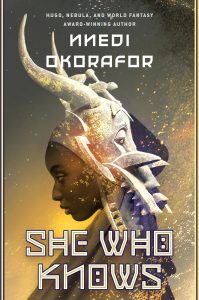She Who Knows by Nnedi Okorafor: Review by Gary K. Wolfe
 She Who Knows, Nnedi Okorafor (DAW 978-0-75641-895-3, $23.00, 176pp, hc) August 2024.
She Who Knows, Nnedi Okorafor (DAW 978-0-75641-895-3, $23.00, 176pp, hc) August 2024.
As with any good fantasy setting, Nnedi Okorafor’s 2010 World Fantasy Award-winning Who Fears Death introduced us to a world that seemed far more expansive than what was contained in the text. Set in a far-future Sudan in which the Okeke people face brutal oppression by the Nuru, it combined hints of a bygone technological age with some spectacular supernatural fireworks, in telling of a remarkable young woman named Onyesonwu discovering her own world-changing powers. Okorafor’s 2015 novel The Book of Phoenix, at least in its frame story, was a prequel of sorts, explaining how a few elements of that world came about, such as the ‘‘Great Book’’ which served as a foundational text for that oppressive society. But there are different kinds of prequels and sequels. She Who Knows, the first in a projected trilogy of novellas, focuses not on the broad historical forces shaping this society, but rather on the family at the center of the saga, and in particular on Onyesonwu’s mother Najeeba, whose name translates as ‘‘She Who Knows.’’ Readers of Who Fears Death who remember the harrowing violence visited on Najeeba in the early chapters of that novel might reasonably feel a bit apprehensive, but She Who Knows takes place long before Onyesonwu’s birth, recounting the teenage Najeeba’s discovery of her own hidden powers, while hinting that the trilogy will be a sequel as well as a prequel to the earlier novel.
As with Who Fears Death, the characters in She Who Knows use futuristic technologies like capture stations and ‘‘portables’’ (and there’s even a mention of those computers found in caves), but the main focus is on a far more ancient tradition. Every year, Najeeba’s father and brothers travel the salt roads to bring the precious commodity back to their village. ‘‘Salt was sacred to my people,’’ Najeeba tells us. ‘‘It was life but also culture, self-worth, our purpose for existing.’’ When the 13-year-old Najeeba begs her father to come along, in contravention of the rigidly assigned gender roles of her village, he surprisingly agrees. Despite alienating both her best friend and her boyfriend, Najeeba persists, and when her family discovers a fabulous source of pristine salt cubes in an ancient lakebed, she learns that she’s not only a skilled prospector, but a brilliant auctioneer: Disguised as a boy to avoid a public scandal, she manages to earn enough from the haul to set her family up for more than a year. Recognizing her abilities, her father and brothers insist on her joining them in subsequent years, always facing the danger that revealing her true identity could bring the wrath of the entire village down on the family.
The young woman outsider who discovers her own skills and powers after defying convention is a recurring figure in Okorafor’s fiction going all the way back to Zahrah the Windseeker. Like those earlier figures, Najeeba eventually discovers talents that go far beyond mundane skills like oratory, and that draw the novella closer to the kind of wildly imaginative fantasy that has become Okorafor’s trademark. But despite a few spectacular inventions such as ‘‘witches,’’ a sort of giant sentient desert dust-devil (something comparable shows up in The Shadow Speaker and Like Thunder), She Who Knows is a surprisingly intimate novel. Najeeba’s relationship with her quietly courageous father is drawn with insight and sensitivity, and the emotional growth of her initially skeptical brothers – who eventually become her co-conspirators – is both nuanced and oddly moving, all conveyed in prose of remarkable concision and clarity. By the end, when Najeeba offers a brief glimpse of her later life, including meeting her beloved husband Idris, the novella moves clearly into sequel territory, invoking the grief of a mother, now middle aged, who tries to cope with the loss of a daughter who had changed the world. While this slingshot ending sets up the rest of the series, She Who Knows is its own tale of courage and defiance, and one that is eminently readable even to those unfamiliar with Who Fears Death.
Interested in this title? Your purchase through the links below brings us a small amount of affiliate income and helps us keep doing all the reviews you love to read!
Gary K. Wolfe is Emeritus Professor of Humanities at Roosevelt University and a reviewer for Locus magazine since 1991. His reviews have been collected in Soundings (BSFA Award 2006; Hugo nominee), Bearings (Hugo nominee 2011), and Sightings (2011), and his Evaporating Genres: Essays on Fantastic Literature (Wesleyan) received the Locus Award in 2012. Earlier books include The Known and the Unknown: The Iconography of Science Fiction (Eaton Award, 1981), Harlan Ellison: The Edge of Forever (with Ellen Weil, 2002), and David Lindsay (1982). For the Library of America, he edited American Science Fiction: Nine Classic Novels of the 1950s in 2012, and a similar set for the 1960s. He has received the Pilgrim Award from the Science Fiction Research Association, the Distinguished Scholarship Award from the International Association for the Fantastic in the Arts, and a Special World Fantasy Award for criticism. His 24-lecture series How Great Science Fiction Works appeared from The Great Courses in 2016. He has received six Hugo nominations, two for his reviews collections and four for The Coode Street Podcast, which he has co-hosted with Jonathan Strahan for more than 300 episodes. He lives in Chicago.
This review and more like it in the August 2024 issue of Locus.
 While you are here, please take a moment to support Locus with a one-time or recurring donation. We rely on reader donations to keep the magazine and site going, and would like to keep the site paywall free, but WE NEED YOUR FINANCIAL SUPPORT to continue quality coverage of the science fiction and fantasy field.
While you are here, please take a moment to support Locus with a one-time or recurring donation. We rely on reader donations to keep the magazine and site going, and would like to keep the site paywall free, but WE NEED YOUR FINANCIAL SUPPORT to continue quality coverage of the science fiction and fantasy field.
©Locus Magazine. Copyrighted material may not be republished without permission of LSFF.









